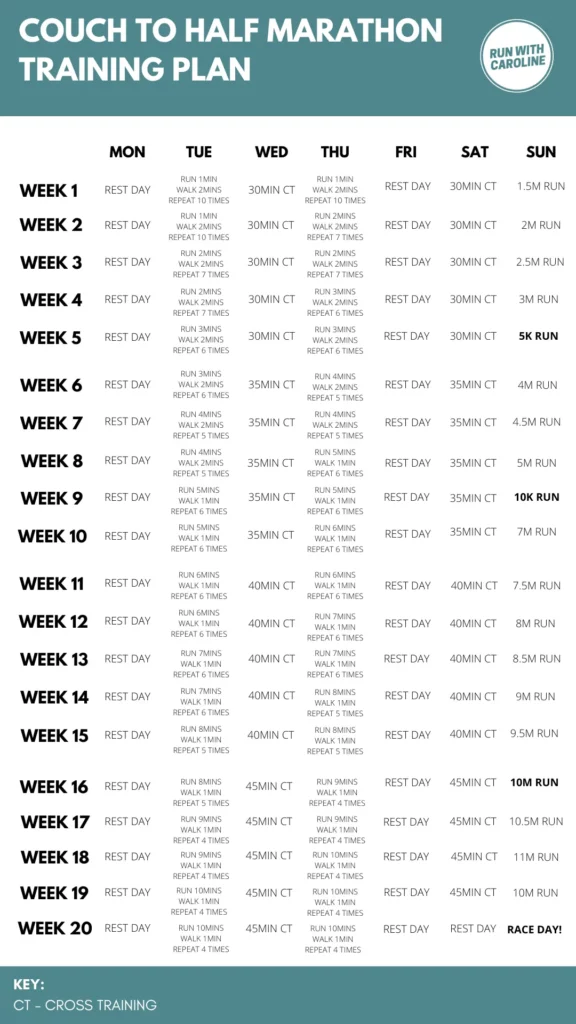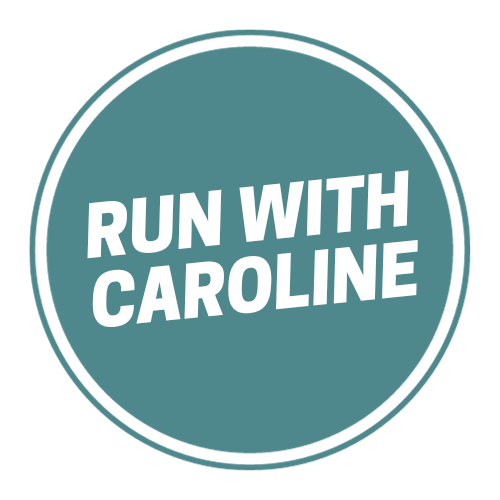Ever wondered if you can run a half marathon?
Many runners watch events like the Great North Run or the London Marathon and feel inspired to start their own running adventure.
Going from a couch potato to half marathon maven is no easy feat, but it’s entirely doable!
I remember when I first started training for my first half marathon.
During the first week, I felt completely overwhelmed by how far I needed to go in order to achieve my goal.
But once I had a few weeks under my belt, the training became that much easier and my confidence grew.
This is also where a couch to half marathon training plan can help!
A training plan tells you exactly what you need to do each week in order to reach your half marathon goal.
So if you’ve never run before a half marathon before, the training plan in this guide has got you covered!
In this guide we’ll look at:
- How long is a half marathon?
- How long does it take to go from couch to half marathon?
- Are you ready to go from couch to half marathon?
- Couch to half marathon running tips
- Couch to half marathon Q&A
- The ultimate couch to half marathon training plan
Ready?
Let’s go!
Summary:
- The plan in this guide will take you from couch to half marathon in 20 weeks.
- The plan includes walking/running intervals, long runs, cross training and race tests.
- To maximise success, wear the appropriate footwear and gear, focus on nutrition and hydration, track your progress, perfect your running form, take rest days seriously and learn how to taper properly.

How long is a half marathon?
A half marathon in miles is 13.1 miles.
In kilometres, a half marathon is 21.09 kilometres.
The half marathon is one of the most popular race distances in the world.
It has grown steadily in popularity since 2003 and as of 2008 it was the fastest-growing type of race in the USA.
Related: Training for a half marathon? Here are 15 tips to make training easier
How long does it take to go from couch to half marathon?
How long it takes you to train for a half marathon as a beginner will depend on a variety of factors, including your running goals, fitness levels and lifestyle.
Typically, a couch to half marathon training plan can last anywhere between 15 to 20 weeks.
The plan in this guide is 20 weeks long.
There are shorter plans out there, but this is roughly the amount of training time I feel you need in order to train to run a 13.1 miles by the end of the plan.
Related: What is a good half marathon time? Average half marathon times by age and gender

Related: 3 easy ways to boost your running form and technique
Are you ready to go from couch to half marathon?
You should be able to run continuously for at least 5 minutes before starting this plan.
You’ll see in the plan at the end of this guide that you will be using walking/running intervals throughout the entirety of the plan.
This way you gradually build up your endurance and stamina each week.
If you feel the plan is too aggressive, you can adjust the intervals each week to include less running and more walking.
The key is to perform only the intervals that feel comfortable for you and your body.
It’s much better to cover the distance each week safely and reach the half marathon milestone without injury.
You can also repeat a week, but just make sure you leave enough training time before race day.
Remember a training plan is only successful if you can do the runs consistently each week.
Ask yourself: Can you realistically fit three runs and two cross training workouts in your week each week?
You need to sacrifice time when training for a half marathon, so take a look at your schedule and understand what’s feasible.
Related: How long is a half marathon? Training plans + 7 tips for race success
Couch to half marathon running tips
Here are some running tips to help you on your way to running the couch to half marathon plan.
#1 Wear the right running shoes
You’ll need a decent pair of running shoes before you start running to ensure your feet are supported over the next 20 weeks.
Running shoes have two key functions:
- Absorb the shock when your foot lands on the ground (this is called cushioning).
- Encourage your feet to move in a safe and efficient manner through running gait.
Nowadays, running shoes are designed to improve your comfort on runs and reduce the risk of common running injuries.
Visit your local running shoe store where they will hopefully be able to offer you a free gait analysis and measure your feet to find the best shoes for you.
Related: How to find the right running shoes: A complete guide
#2 Wear the right gear
Along with a pair of proper running shoes, you’ll want to ensure you are wearing clothing and gear that is comfortable and supportive.
A well-fitting sports bra is a must, along with running leggings or shorts, running socks, a running top and a running jacket (if you’re planning to run during the winter months).
Related: 7 of the best websites to buy affordable running clothes
#3 Fuel your runs
Nutrition is incredibly important when it comes to half marathon training.
Half marathon training can be gruelling, so you want to ensure you are fuelling your body in the best way possible.
Your pre-run meal should be:
- High in carbohydrates
- Moderate in protein
- Low in fat and fibre
This is because carbohydrates release energy a lot faster than protein and fat.
Fat and fibre are also slow to digest so it’s best to avoid foods high in these nutrients.
According to a 2015 study, for high intensity, long duration runs, muscles prefer carbohydrates as their fuel source, regardless of whether the runner has eaten or not.
Simply put, the more carbs you eat, the more energy reserves your body will have to tap into on race day.
This is why ‘carb loading’ is so important on the days leading up to a long race like a half marathon.
Related: What to eat before running in the morning: 8 eating tips
#4 Stay hydrated
When you run, you lose fluid by sweating and breathing. As soon as you start to run, you start to dehydrate.
It is thought that approximately 75% of the energy you put into exercise is converted into heat and is then lost.
Your body keeps cool by sweating, which makes the replacement of these fluids crucial.
Aim to drink at least a litre of water and keep drinking regularly for the next few hours until your urine is the colour of pale straw or lighter.
Related: Hydration and running performance: 4 key hydration tips for runners

#5 Track your progress
Now is a good time to invest in a GPS running watch.
A GPS running watch will enable you to log all of your training runs and track your progress and key stats in terms of mileage, pace, heart rate, VO2 max and much more!
If you can’t afford to invest in a running watch, fear not, there are plenty of running apps on the market that offer much of the same features.
Related: 8 of the best running apps for beginners + the pros and cons of each
#6 Focus on your form
Proper running form is important, but many runners don’t know what it consists of.
Running form and technique is all about running in the most efficient and economical way possible.
This means placing as little stress as possible on your muscles and joints.
There are five key areas:
- Posture
- Arm swing
- Core strength
- Cadence
- Footstrike
Read my guide on proper running form and technique fore more information.
Related: 5 key principles of proper running form and technique (and why they matter)
#7 Take rest days seriously
The rest days are scheduled in the plan for a reason, so don’t be tempted to run through your rest days.
You risk training burnout, overtraining and injury if you try and run every day of the plan.
Use the rest days in the plan to focus on recovery and repair.
Your body will go through a lot so it’s important you treat it with kindness!
You don’t want to be running with tired and achey legs all the time.
Stretching, foam rolling, ice baths, a nutritious meal – these are all great things to prioritise on your rest day.
Related: Recovery after running: 5 essential recovery tips after a long run
#8 Taper
The wind-down period (known as the tapering period) before your half marathon is key.
During this period you will reduce the volume of training to give your body some restbite.
It’s normal for the longest run in the plan to take place 2 weeks before the half marathon event.
Related: Intermediate half marathon training plan: Week by week plan + printable
Couch to half marathon Q&A
Q: How fast should I be running?
A: You should run at a comfortable pace for you, so this means you should be able to comfortably hold a conversation while you run.
If at any point you get out of breath, this means you are running too fast.
The focus of the plan isn’t speed, it’s about improving your endurance, so don’t worry about speed.
Q: What is a good half marathon time?
A: Your half marathon time will depend on various factors such as your age, gender, fitness levels and running experience.
Even the weather and terrain can impact how fast you run on race day!
By completing the plan in this guide, you can expect to finish a half marathon in between 2 to 3 hours.
- A good half marathon time for a man is 1:43:33. This is the average half marathon time across men of all ages.
- A good half marathon time for a woman is 2:00:12. This is the average half marathon time across women of all ages.
Q: What about strength training?
A: The plan includes two cross training workouts each week.
It’s up to you what you do during these workouts, but one option is to include some strength training if you are comfortable doing so.
Check out my strength training guide for runners for more hints and tips.
Related: Half marathon training plan for beginners: Week by week plan + printable

The ultimate couch to half marathon training plan
About the plan
Here is a breakdown of the couch to half marathon plan.
Walking and running intervals
You’ll see that each week you’ll be walking and running, with the running intervals progressively getting longer each week.
By walking and running you will gradually build up your endurance and stamina throughout the plan.
Long run
On Sunday each week you will have a long run, with the shortest being 1.5 miles in week 1 and the longest being 11 miles in week 18.
The long run is the mainstay of any half marathon training plan so it’s important you complete the long run each week.
You’ll see in the first few weeks, there is the option to walk/run the long run if you don’t feel comfortable running continuously.
By week 5 you should be able to run continuously but don’t be afraid to take walking breaks if you need them.
The aim for each week is to focus on completing the scheduled runs at a pace that is comfortable for you.
Don’t worry about speed at this stage as that will come later once you’ve built up your endurance and stamina.
Cross training
There are two cross training workouts scheduled each week.
Walking, cycling, swimming and yoga are all great forms of cross training for runners.
The key is not to go too hard during these sessions – think of them as active recovery.
If you feel too sore after a run, then skip the cross training workout and focus on total rest and recovery.
Race test
At weeks 5 and 9 you will have a race test in the form of a 5k (week 5) and 10k (week 9).
Race tests are a great way to apply what you’ve learned during your training and track your progress!
Related: 5 rules for half marathon training

Week by week plan
Week 1:
- Monday: Rest day
- Tuesday: Run for 1 minute, walk for 2 minutes, repeat 10 times
- Wednesday: 30 minute cross training
- Thursday: Run for 1 minute, walk for 2 minutes, repeat 10 times
- Friday: Rest day
- Saturday: 30 minute cross training
- Sunday: 1.5 mile run (walk/run if needed)
Week 2:
- Monday: Rest day
- Tuesday: Run for 1 minute, walk for 2 minutes, repeat 10 times
- Wednesday: 30 minute cross training
- Thursday: Run for 2 minutes, walk for 2 minutes, repeat 7 times
- Friday: Rest day
- Saturday: 30 minute cross training
- Sunday: 2 mile run (walk/run if needed)
Week 3:
- Monday: Rest day
- Tuesday: Run for 2 minutes, walk for 2 minutes, repeat 7 times
- Wednesday: 30 minute cross training
- Thursday: Run for 2 minutes, walk for 2 minutes, repeat 7 times
- Friday: Rest day
- Saturday: 30 minute cross training
- Sunday: 2.5 mile run (walk/run if needed)
Week 4:
- Monday: Rest day
- Tuesday: Run for 2 minutes, walk for 2 minutes, repeat 7 times
- Wednesday: 30 minute cross training
- Thursday: Run for 3 minutes, walk for 2 minutes, repeat 6 times
- Friday: Rest day
- Saturday: 30 minute cross training
- Sunday: 3 mile run (walk/run if needed)
Week 5:
- Monday: Rest day
- Tuesday: Run for 3 minutes, walk for 2 minutes, repeat 6 times
- Wednesday: 30 minute cross training
- Thursday: Run for 3 minutes, walk for 2 minutes, repeat 6 times
- Friday: Rest day
- Saturday: Rest day
- Sunday: 5k run!
Week 6:
- Monday: Rest day
- Tuesday: Run for 3 minutes, walk for 2 minutes, repeat 6 times
- Wednesday: 35 minute cross training
- Thursday: Run for 4 minutes, walk for 2 minutes, repeat 5 times
- Friday: Rest day
- Saturday: 35 minute cross training
- Sunday: 4 mile run
Week 7:
- Monday: Rest day
- Tuesday: Run for 4 minutes, walk for 2 minutes, repeat 5 times
- Wednesday: 35 minute cross training
- Thursday: Run for 4 minutes, walk for 2 minutes, repeat 5 times
- Friday: Rest day
- Saturday: 35 minute cross training
- Sunday: 4.5 mile run
Week 8:
- Monday: Rest day
- Tuesday: Run for 4 minutes, walk for 2 minutes, repeat 5 times
- Wednesday: 35 minute cross training
- Thursday: Run for 5 minutes, walk for 1 minute, repeat 6 times
- Friday: Rest day
- Saturday: 35 minute cross training
- Sunday: 5 mile run
Week 9:
- Monday: Rest day
- Tuesday: Run for 5 minutes, walk for 1 minute, repeat 6 times
- Wednesday: 35 minute cross training
- Thursday: Run for 5 minutes, walk for 1 minute, repeat 6 times
- Friday: Rest day
- Saturday: Rest day
- Sunday: 10k run!
Week 10:
- Monday: Rest day
- Tuesday: Run for 5 minutes, walk for 1 minute, repeat 6 times
- Wednesday: 35 minute cross training
- Thursday: Run for 6 minutes, walk for 1 minute, repeat 6 times
- Friday: Rest day
- Saturday: 35 minute cross training
- Sunday: 7 mile run

Week 11:
- Monday: Rest day
- Tuesday: Run for 6 minutes, walk for 1 minute, repeat 6 times
- Wednesday: 40 minute cross training
- Thursday: Run for 6 minutes, walk for 1 minute, repeat 6 times
- Friday: Rest day
- Saturday: 40 minute cross training
- Sunday: 7.5 mile run
Week 12:
- Monday: Rest day
- Tuesday: Run for 6 minutes, walk for 1 minute, repeat 6 times
- Wednesday: 40 minute cross training
- Thursday: Run for 7 minutes, walk for 1 minute, repeat 6 times
- Friday: Rest day
- Saturday: 40 minute cross training
- Sunday: 8 mile run
Week 13:
- Monday: Rest day
- Tuesday: Run for 7 minutes, walk for 1 minute, repeat 6 times
- Wednesday: 40 minute cross training
- Thursday: Run for 7 minutes, walk for 1 minute, repeat 6 times
- Friday: Rest day
- Saturday: 40 minute cross training
- Sunday: 8.5 mile run
Week 14:
- Monday: Rest day
- Tuesday: Run for 7 minutes, walk for 1 minute, repeat 6 times
- Wednesday: 40 minute cross training
- Thursday: Run for 8 minutes, walk for 1 minute, repeat 5 times
- Friday: Rest day
- Saturday: 40 minute cross training
- Sunday: 9 mile run
Week 15:
- Monday: Rest day
- Tuesday: Run for 8 minutes, walk for 1 minute, repeat 5 times
- Wednesday: 40 minute cross training
- Thursday: Run for 8 minutes, walk for 1 minute, repeat 5 times
- Friday: Rest day
- Saturday: 40 minute cross training
- Sunday: 9.5 mile run
Week 16:
- Monday: Rest day
- Tuesday: Run for 8 minutes, walk for 1 minute, repeat 5 times
- Wednesday: 45 minute cross training
- Thursday: Run for 9 minutes, walk for 1 minute, repeat 4 times
- Friday: Rest day
- Saturday: 45 minute cross training
- Sunday: 10 mile run
Week 17:
- Monday: Rest day
- Tuesday: Run for 9 minutes, walk for 1 minute, repeat 4 times
- Wednesday: 45 minute cross training
- Thursday: Run for 9 minutes, walk for 1 minute, repeat 4 times
- Friday: Rest day
- Saturday: 45 minute cross training
- Sunday: 10.5 mile run
Week 18:
- Monday: Rest day
- Tuesday: Run for 9 minutes, walk for 1 minute, repeat 4 times
- Wednesday: 45 minute cross training
- Thursday: Run for 10 minutes, walk for 1 minute, repeat 4 times
- Friday: Rest day
- Saturday: 45 minute cross training
- Sunday: 11 mile run
Week 19:
- Monday: Rest day
- Tuesday: Run for 10 minutes, walk for 1 minute, repeat 4 times
- Wednesday: 45 minute cross training
- Thursday: Run for 10 minutes, walk for 1 minute, repeat 4 times
- Friday: Rest day
- Saturday: 45 minute cross training
- Sunday: 10 mile run
Week 20:
- Monday: Rest day
- Tuesday: Run for 10 minutes, walk for 1 minute, repeat 4 times
- Wednesday: 30 minute cross training
- Thursday: Run for 10 minutes, walk for 1 minute, repeat 4 times
- Friday: Rest day
- Saturday: Rest day
- Sunday: Half marathon!
Couch to half marathon plan PDF

Other half marathon training plans
- 5 things I wish I’d known before returning to running - March 3, 2024
- Running 20 minutes a day: Benefits + how to start - January 27, 2024
- How to run your first 2 hour half marathon - January 16, 2024
